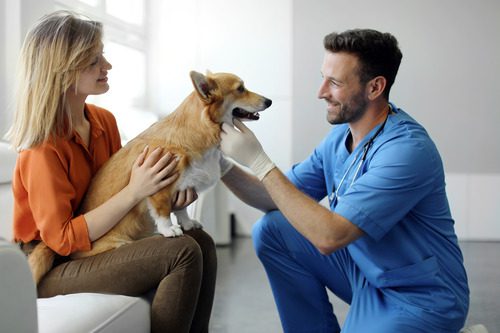How to Spot Early Signs of Dental Disease in Pets
Your pet’s health extends beyond their fur and overall energy levels. Just like humans, pets can suffer from dental disease, a condition that often starts silently but can lead to significant health problems if left untreated. As a pet parent, recognizing the early signs of pet dental disease can save your furry friend from pain and ensure their overall well-being. At Coronado Veterinary Hospital in Coronado, CA, we’re here to help you keep your pet’s smile bright and healthy. Read on to learn how to identify potential dental issues before they escalate. If you’re concerned about your pet’s oral health, call us at (619) 435-6281 or make an appointment online today.

What is Pet Dental Disease?
Pet dental disease, also known as periodontal disease, affects the gums, teeth, and supporting structures in your pet’s mouth. It begins with plaque build-up, which hardens into tartar if not addressed. Over time, this can lead to inflamed gums (gingivitis), infections, tooth loss, and even damage to internal organs like the heart and kidneys. This common condition doesn’t just affect older pets. Dental disease can begin as early as three years old in both dogs and cats. Despite its prevalence, many pet owners overlook the signs of dental problems until the disease has progressed.
Early Signs of Pet Dental Disease to Watch For
Spotting the initial signs of pet dental disease can help you act before more severe issues develop. Here are some early indicators to be mindful of:
Bad Breath
While it’s normal for pets to have mild breath odor, a strong, foul smell could indicate bacteria build-up in the mouth. Persistent bad breath is often one of the first signs of dental disease.
Red or Swollen Gums
Healthy gums should be pink and firm. If you notice redness, swelling, or bleeding gums when your pet eats or chews, it’s a sign of gingivitis.
Tartar Build-Up
Take a look at your pet’s teeth. Yellow or brown tartar on the surface of the teeth, especially near the gum line, is a sign that professional dental cleaning might be necessary.
Difficulty Eating
If your pet is dropping food, chewing on one side, or avoiding certain types of food, they may be experiencing pain from dental issues.
Pawing at the Mouth
Pets with dental discomfort may paw at their mouths or rub their faces on furniture and carpets in an attempt to alleviate the pain.
Changes in Behavior
Irritability, lethargy, or withdrawal from social interactions can sometimes be linked to the discomfort of dental disease.
Long-Term Effects of Ignoring Dental Disease
If left untreated, pet dental disease can lead to severe complications. Advanced periodontal disease can cause your pet significant pain and lead to:
- Tooth Loss: Damaged teeth may loosen or fall out entirely.
- Oral Infections: Untreated infections can spread to the jawbone and other tissues.
- Systemic Health Issues: Bacteria from dental disease can enter your pet’s bloodstream, potentially affecting the heart, liver, and kidneys.
Taking action at the first signs of pet dental disease can prevent these long-term consequences and improve your pet’s quality of life.
The Role of Professional Dental Care
While daily care at home is essential, professional dental care is critical for preventing and addressing pet dental disease. At Coronado Veterinary Hospital, we provide comprehensive dental services, including:
- Dental Exams: A thorough evaluation of your pet’s teeth and gums.
- Professional Cleanings: Removal of tartar and plaque under anesthesia to ensure your pet’s comfort and safety.
- X-rays: To detect hidden issues below the gum line.
- Treatment Plans: Tailored solutions for any identified dental problems.
Routine veterinary visits allow us to catch early signs of dental disease and provide the necessary care before issues escalate.
Tips for Preventing Pet Dental Disease
Prevention is always better than treatment. Here are some steps you can take to maintain your pet’s oral health:
- Regular brushing with pet-safe toothpaste is one of the most effective ways to prevent plaque build-up. Aim for daily brushing or at least several times a week.
- Dental treats and chews can help reduce plaque and tartar while satisfying your pet’s natural chewing instincts. Look for products approved by the Veterinary Oral Health Council (VOHC).
- Some pet foods are formulated to promote oral health. These diets can complement other dental care efforts.
- Additives designed for pets can be mixed into their drinking water to combat bacteria and freshen breath.
- Routine veterinary exams are essential for monitoring your pet’s overall health, including their oral health. These visits allow your vet to spot problems early and recommend appropriate treatments.
When Is It Time to Call Your Veterinarian?
If you notice any signs of pet dental disease or suspect your pet is in discomfort, don’t wait. Early intervention can save your pet from unnecessary pain and prevent more severe health issues down the road. At Coronado Veterinary Hospital, we’re dedicated to providing top-notch dental care for your beloved pets. Call us at (619) 435-6281 or make an appointment online to ensure your furry friend’s smile stays healthy and bright.
About Us
Coronado Veterinary Hospital, a family-owned practice in Coronado, CA, prioritizes the human-animal bond, offering personalized care for pets in the area for over 70 years. With a broad spectrum of services tailored to meet the unique needs of each pet, our team is dedicated to nurturing pets' health with compassionate, comprehensive care.